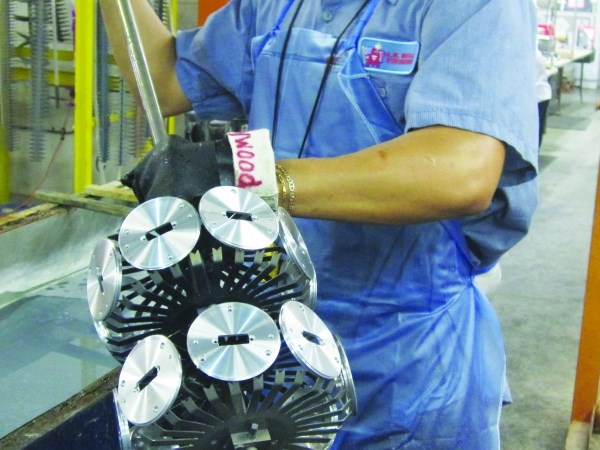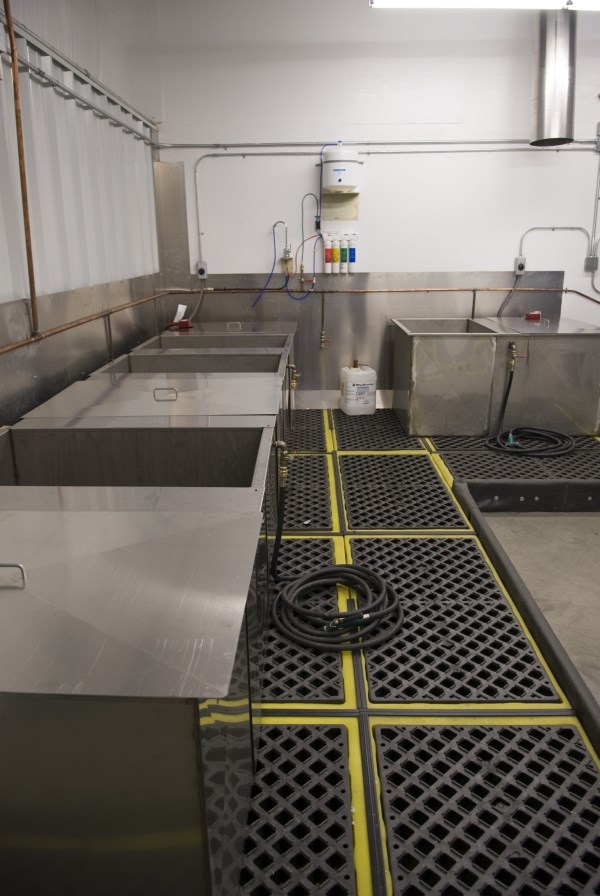Nathan Keen is a rare bird when it comes to the plating industry.
His company,
K-Form Inc. in Sterling, Va., added a new plating line in March after sending the work out to be finished for the past decade or so. He has spent more than $150,000 so far on the line, and said total costs might come in around $500,000 when his new project to plate parts is complete.
It’s an ever-increasing sign that more finishers are warming up to using non-chrome passivation as a way to satisfy customers who don’t want to use hexavalent chromium for corrosion treatment.
“NCP works just as good as the other stuff, or else I wouldn’t offer it to my customers,” says Keen, who has owned
K-Form for more than 30 years and now runs it with his two sons, Callye and Noah, and their 25 employees.
“We used to do yellow chrome finishes in-house, but it really was a headache to deal with, so we found people up the street to do it for us,” he says. “What I had been reading and hearing about the new products coming out—safer, if you want to call it that—it just made sense to get back into it and offer these services again and to have the control I wanted over my parts.”
MORE REQUESTS FOR NCP
Established platers also are reporting increased requests for NCP finishes from customers, especially those in the aerospace industry who often are the last bastion of change in the entire industrial sector.
Rick Hunter, owner of A.M. Metal Finishing in Orlando, Fla., says he has seen increased demand for the non-chrome protective finishes from his aerospace customers.
“There’s no question that hexavalent and trivalent are what a majority of people are asking for, but we are starting to see the demand for those willing to let us use a non-chrome finish grow more and more,” says Hunter, who has 2,500-gal tanks for each hexavalent and trivalent line and a 900-gal tank for NCP work.
“The change is coming, but it’s a slow change,” he says. “The biggest driver will be the government and the military. It’s all about what the specs are right now. If they change the specs, they change the demand.”
Both K-Form and A.M. Metal Finishing are using one of the more popular NCP products on the market,
MacDermid Enthone’s Iridite NCP, which was developed in response to current regulations and directives both in the U.S. and in Europe, including “End of Life Vehicles” (ELV), “Restriction Of The Use Of Certain Hazardous Substances In Electrical And Electronic Equipment” (RoHS) and “Waste Electrical and Electronic Equipment” (WEEE).
MacDermid’s Michael Barnstead said Iridite NCP does not contain lead, cadmium, hexavalent or trivalent chromium, mercury or PBB/PBDE compounds. When it debuted several years ago, Barnstead said it was the first NCP to offer bare corrosion protection, while the others were adhesion promoters for subsequent paint.
DOD LEADING INITIATIVE
“The Department of Defense has an initiative to eliminate leachable hex chrome, so they are one of the biggest drivers of this line of products,” Barnstead says. “The DoD is leading the way here. The commercial airlines are a lot slower to change.”
MacDermid and other plating chemical companies have the data from the automotive industry to back up their claims that the NCP products are just as good as the hex and trivalent coatings, but there still has been some resistance from aerospace manufacturers who are risk averse when it comes to change.
“I told one aerospace manufacturer about the extensive field data we had from the automotive industry,” Barnstead says. “But he still told me, ‘Look, automotive failure is one thing, but our failure mode is always the same: catastrophic.’ And it’s hard to argue with that.”
But that’s not to say that major aerospace and defense contractors are not looking for ways to distance themselves from chrome or other targeted materials that have been a mainstay for decades.
Boeing is constructing a new metal processing facility in Portland, Ore., set to open this year, that will replace the use of cadmium plating with zinc nickel, which the company says is now approved by the Federal Aviation Administration to meet airplane corrosion safety standards.
REDUCING HEX CHROME USE
Boeing also is reducing the use of hex chromium, using chrome-free primers and paints on military aircraft, including the AH-64 Apache helicopter, C-17 airlifter, and the F-15 and F/A-18 tactical aircraft. The program has expanded to its commercial airplanes, too, with airlines currently testing chrome-free finishes on 20 of the Boeing 737s and six 777s in commercial service.
In addition to reducing chrome in exterior applications, Boeing said the 777 program launched a pilot program last year to remove chrome primer from aluminum tubing used in the aircraft. As part of this process, design engineers switched from vapor to aqueous degreasing techniques for tubing, resulting both in the elimination of hazardous materials and the reduction of energy use.
“Boeing is partnering with universities across the U.S. to research advanced technologies, including multifunctional coatings and sealing systems, to replace chrome entirely,” a Boeing spokesperson says. “We continue looking for opportunities to reduce the use of hazardous chemicals in our products and operations to benefit our employees, our customers and the environment.”
Which is good news for platers and products like MacDermid’s Iridite NCP, which can be used not only as a final finish on aluminum, but also as a paint base, a high-performance topcoat or a treatment before powder coating since it qualifies under MIL-DTL-81706B, Type 2B 1A, B&C and MIL-DTL-5541F.
PRODUCT IS CLEAR
One of the biggest drawbacks to Iridite NCP is what you can’t see: the product is clear, which causes some concern amongst its users about whether the product is actually on the part. This is obvious when using hex chrome, as the part would be shiny.
K-Form’s Keen said he has had an issue with customers who say they want to actually see the finish on the part.
“There is a certain amount of trust that people have, but like Reagan said, ‘Trust, but verify,’” he says. “We show them all the certifications, all the paperwork, all the things they need to see, but nothing beats that look of a part and seeing the finish. Under a bright light you’ll see a blueish hue to it, but sometimes it all comes down to aesthetics.”
Says Hunter: “Often the plated part looks just like it did when it came in, so it has been a concern.”
Barnstead says MacDermid tinkered with putting a dye into the coating, but was unsuccessful because the dye did not readily incorporate into the coating.
2007, 2009 EXECUTIVE ORDERS
MacDermid and other chemical companies are hoping that the use of NCPs will continue to pick up, especially because of the 2007 and 2009 presidential executive orders requiring the DoD to look for safer alternatives to hex chromium, as well as the 2009 directive by the DoD’s acquisition chief, John Young, that the military’s use of hex chromium be phased out.
“The interest really perked up in Iridite NCP after those directives, and we certainly have seen an uptick in sales over the last several years,” Barnstead says. “But the DFARs that came out did exempt conversion coatings from going to a non-chrome, which is different than what RoHS and ELV has required. My opinion is that will change, and you will probably see more finishers moving to the NCP.”
Finishers like A.M. Metal Finishing’s Hunter advises any shop to work closely with its suppliers when it starts the process of adding an NCP line and gain the knowledge needed to operate the new formulations successfully.
He sent about eight of his staff to MacDermid’s headquarters in Connecticut to become trained on the NCP process, as well as to learn how to educate their own customers on the technology.
“They were one of the few in the industry to offer that to us, and even though we picked up the travel tab, it was well worth it to us,” Hunter says.
Like
K-Forms’ Keen, Hunter says platers have to be ready when the customer calls on them with a specific request for a certain type of coating or treatment.
“If you’re in the plating industry, then you need to keep bopping and weaving in the marketplace just like a prizefighter,” Hunter says.
National Association for Surface Finishing












.jpg;maxWidth=300;quality=90)









